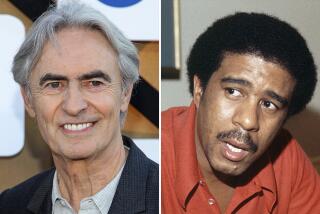Review: ‘Merchants of Doubt’ shows how public opinion is manipulated
Don’t underestimate Robert Kenner’s “Merchants of Doubt.” It may sound like a standard-issue advocacy documentary concerned, as so many are, with the perils of global warming, but it’s a lot more than that.
It’s not just that “Merchants of Doubt” is loaded with jazzy visuals and even starts with a performance by close-up magician Jamy Ian Swiss filmed at the Magic Castle.
This enthralling film, based on the book by Naomi Oreskes and Erik M. Conway, is as fascinating as it is horrifying. It gives a peek behind the curtain of how public opinion is formed in this country, how spin doctors and media manipulators — often the same folks working across a whole range of issues — get people to ignore science at their own peril.
“Merchants” posits that it all goes back to the tobacco industry and the battle over the hazards of cigarettes to health. As described by anti-tobacco scientist Stanton Glantz, the turning point came when a leak of internal tobacco-industry documents revealed that the cigarette companies knew their product caused cancer as early as the 1950s.
But, acting on the advice of advertising firm Hill & Knowlton, the tobacco firms realized that, to quote one of their own documents, “doubt is our product since it is the best means of competing with the ‘body of fact’ that exists in the mind of the general public.” As the film notes, every day that action is delayed on one of these issues is another day when money can be made.
Given that this strategy of “scientists are divided, we don’t have enough data” worked for big tobacco for half a century, it shouldn’t be a surprise that it has served as a playbook for all kinds of other issues and is often implemented by the same individuals and firms that cut their teeth on tobacco.
One of the most fascinating stories “Doubt” tells involves the investigations by Chicago Tribune journalists Patricia Callahan and Sam Roe into how the toxic chemicals that make up flame retardants made it into a wide swath of American furniture.
Just as tobacco had done before it, the chemical industry was able to create fake grass-roots groups with names like Citizens for Fire Safety that pushed the need for their cancer-causing products.
It’s the fight against climate change, however, that gets the most airtime. James Hansen, one of the first scientists to study the problem, “just assumed humanity would take sensible action,” but this has not been the case.
As Oreskes, a historian of science, reports, when she actually looked at all the papers written on the subject by climate scientists, there was near unanimity on the seriousness of the problem.
Creating doubt were advocates posing as scientists as well as scientists in other fields who had covert reasons for jumping on the climate skeptic bandwagon.
Chief among these are Fred Singer and Fred Seitz, who, “Doubt” explains, are unreconstructed cold warriors who see any and all government regulation as slippery slopes toward socialism. In fact, environmentalists are regularly pilloried as “watermelons”: green on the outside, red on the inside.
Some of the most effective moments in “Merchants of Doubt” involve people who were once climate change disbelievers and have come to believe that the threat is real. People like Bob Inglis, the staunchly conservative former North Carolina congressman, and Michael Shermer, executive director of the Skeptics Society and founder of Skeptic magazine.
A disbeliever for decades because of what he felt were exaggerated claims, Shermer changed his mind because “you have to follow the science. Data trumps politics.” This essential documentary will make you wish more people felt that way.
------------
‘Merchants of Doubt’
No MPAA rating.
Running time: 1 hour, 36 minutes
Playing Regency Norwalk 8, Norwalk.
More to Read
Only good movies
Get the Indie Focus newsletter, Mark Olsen's weekly guide to the world of cinema.
You may occasionally receive promotional content from the Los Angeles Times.






